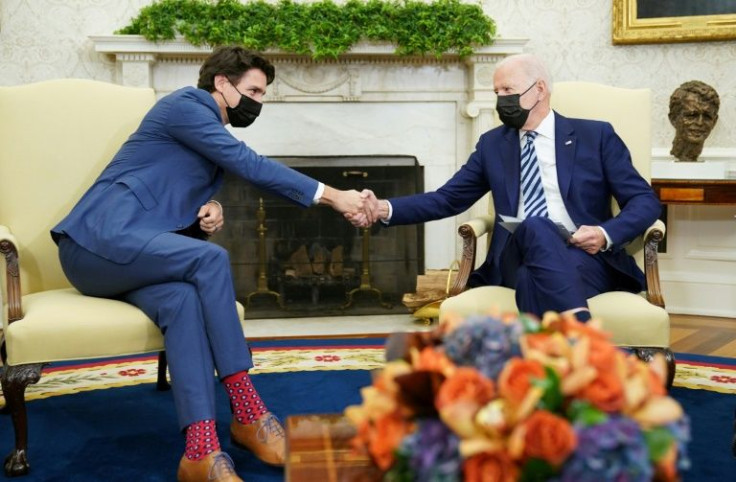US Triumphs Over Canada In First Dispute Under New Trade Deal
The US government on Tuesday said it had won its fight with Ottawa over restrictions in the Canadian dairy market, claiming victory in the first-ever dispute under the revamped North American free trade pact.
But rather than remove a point of conflict between the trading partners, the issue may exacerbate stresses, since both sides have vowed to fight to protect their own industries and workers.
US Trade Representative (USTR) Katherine Tai called the ruling under the US-Mexico-Canada Agreement a "historic win" that "will help eliminate unjustified trade restrictions."
The finding, which could lead to punitive American tariffs on Canadian goods, comes amid growing trade frictions between the neighbors over issues ranging from lumber to milk, as well as newer disputes over solar panels, electric cars and taxes on tech giants.
The conflicts soared under former president Donald Trump, who forced a renegotiation of the two-decade old North American Free Trade Agreement.
The end result was known in the United States by the acronym USMCA and in Canada as CUSMA, but the tensions it was meant to address have not abated under US President Joe Biden.
The agreement came into force in July 2020, and since then, Washington has also used the provisions to pressure Mexican auto factories to protect workers' rights to organize.
Biden in November held a summit with Canada's Prime Minister Justin Trudeau and Mexico's President Andres Manuel Lopez Obrador to try to smooth relations.
But William Reinsch, a trade policy expert at the Center for Strategic and International Studies, said the Biden administration's approach to trade is sometimes viewed as "Trump light."
"The rhetoric is different... it's a more rational, less impulsive policymaking process," he told AFP. But, "Their mindset is in some respects... not that different from Trump's."
Leaders in both countries face a difficult political environment, given Biden's pledge to defend American workers and the relatively larger importance of the dairy market to Canada's economy, Reinsch said.

But this first dispute under USMCA could set an example on how to resolve conflicts amicably -- depending on how Canada responds.
In the complaint first registered in December 2020, Washington objected to Ottawa's practice of reserving a large chunk of milk imported from the United States under preferential tariffs for Canadian dairy processors.
When negotiations failed to reach a settlement, Biden's trade officials escalated the dispute, calling for a panel to adjudicate it.
USTR at the time said the policies "undermine the ability of American dairy exporters to sell a wide range of products to Canadian consumers."
The dispute settlement panel issued its report December 20 and said Ottawa's practice of reserving the products "exclusively for the use of processors is inconsistent with Canada's commitment" under the treaty.
Canada has until February 3 to bring its policies into compliance and if no changes are made, Washington can "impose countermeasures that are equivalent, in effect, to the offending Canadian measures... if we were to reach that point," a senior US trade official told reporters.
The Canadian government welcomed some aspects of the panel's findings, which it said supported the supply management policies, but had "taken note" of the ruling on reserving some imports for producers.
The country "takes its commitments and obligations under international agreements seriously. These include those that Canada has under CUSMA with the United States, Canada's closest trading partner," Trade Minister Mary Ng and Agriculture Minister Marie-Claude Bibeau said in a joint statement.
But they pledged "to stand up for" the dairy industry and "continue to preserve, protect and defend the supply management system."
From January through October 2021, the United States exported $478 million worth of dairy products to Canada, making the country the third-largest export destination for those goods, USTR said.
There are 10,095 dairy farms in Canada, which directly support approximately 19,000 jobs, according to the Canadian government.
© Copyright AFP 2024. All rights reserved.





















